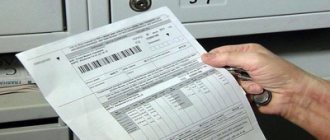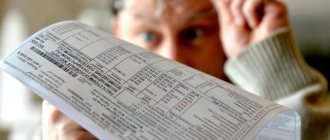How do penalties arise on utility bills?
The obligation to pay for consumed utilities is established by the Housing Code of the Russian Federation and the Civil Code of the Russian Federation.
In case of late payments, penalties are applied to the debtor - penalties, the calculation of which is made in accordance with the provisions of Art. 155 of the Housing Code of the Russian Federation or according to the terms of the agreement concluded between the supplier and consumer of utility services. The concept of the term “penalty” (penalty) and the calculation procedure are prescribed in the provisions of the Civil Code of the Russian Federation, the Housing Code of the Russian Federation:
- Penalties are a measure of influence on the debtor, designed to ensure the fulfillment of contractual obligations (Article 330 of the Civil Code of the Russian Federation).
- By virtue of Art. 155 of the RF Housing Code, the parties who entered into an agreement are given the right to independently calculate penalties and demand their payment for violation of the terms of the transaction.
Penalties are accrued not only in the event of complete absence of payment for consumed services, but also in the event of incomplete payment or delay in existing obligations.
Debt write-off methods
In a number of situations, even a legally accrued penalty may be subject to legal write-off. Sometimes this happens without active efforts on the part of the debtor, and sometimes it requires the latter to perform legally significant actions.
Missing a deadline
According to Art. 196 of the Civil Code of the Russian Federation, the general statute of limitations for filing claims in court is 3 years. The countdown of this period begins from the moment when the subject became aware of the violation of his rights.
The commercial debt supplier must have time to file an appeal to the court for forced collection of lost funds within 3 years. The period begins to count from the moment the person becomes obligated to pay. If the creditor does not meet the time limits, the defendant has the right to apply for the application of the ID period. Such a request serves as a basis for refusing to satisfy the plaintiff’s claims.
Important! The limitation period applies solely upon the application of a party before the approval of the final decision.
This method of avoiding penalties cannot be called one hundred percent. In most cases, the defaulter can only rely on the inattention of the resource supply organization or management company. In practice, this rarely happens, since no one wants to suffer losses through their own fault. And even if the claim was sent at the wrong time, this does not mean that the debt will be written off completely.
Bankruptcy
Recently, an increasing number of citizens have been interested in such a mechanism for releasing debt obligations. However, not every individual is authorized to initiate their own bankruptcy proceedings.
Question:
I haven’t paid my utilities at all for a long time now. The fact is that I lost my job and I can’t solve my financial difficulties, and I barely have enough money for food. Should I declare bankruptcy so that the utility companies will stop insisting on full payment?
Answer:
A citizen has the right to declare himself absolutely insolvent if his monetary claims against him amount to at least 500,000 rubles. In addition, in Art. 213.3. Federal Law No. 127 has one more clause - the period of non-fulfillment of obligations must reach or exceed 3 months.
Declaration of bankruptcy takes place exclusively in court. The process is quite complex and lengthy. The applicant must prove that he is unable to pay his existing debts. If the petition is granted, the creditors' claims are repaid from the bankrupt's property. At the same time, payments for housing and communal services are compensated in third place, after alimony and unpaid wages.
Death of an individual or liquidation of an organization
After the death of the debtor, the property rights and obligations of the latter pass to his heirs. But if no successors are identified, then the debts, including penalties, must be written off. A similar mechanism also works during the liquidation of a legal entity.
An example of calculating penalties for utility bills
In accordance with the provisions of Part 14 of Art. 155 of the Housing Code of the Russian Federation, when calculating penalties, the refinancing rate of the Central Bank of the Russian Federation, relevant at the time the debt for utility services arose, is taken into account. The calculation is made as follows:
- If the total period of delay in utility payments is from 30 to 90 calendar days, the amount of the penalty is equal to 1/300 of the refinancing rate of the Central Bank of the Russian Federation of the amount of debt.
- If the period of delay is more than 90 days, the amount of the penalty is 1/130 of the refinancing rate of the amount unpaid for utilities.
Changing the amount of the penalty upward is not allowed. However, if there is initiative on the part of the management company, the amount of the penalty can be reduced.
Here is an example of calculating penalties:
In accordance with the provisions of the agreement concluded with the management company, a citizen living in an apartment building was required to pay for consumed utilities no later than the 10th day of each month. On July 10, 2021, the consumer did not transfer money in the required amount, the amount of debt amounted to 3,000 rubles. Penalties are accrued no earlier than the 31st day after the delay occurs (in our case, from August 9). The total amount of debt as of August 22, 2021 increased to 6,000 rubles, since utility bills have not been paid for more than two months. As of August 22, 2021, the amount of the penalty should be calculated as follows (assume the refinancing rate is 4.5%):
- From July 10 to August 8 (30 days) no penalties are charged.
- From August 9 to August 22, the amount of the penalty will be: 6000 (amount of debt) × 14 (number of days from the date the penalty begins to accrue) × 1/300 (percentage, according to Part 14 of Article 155 of the RF Housing Code) × 4.5 (Central Bank refinancing rate RF) = 12 rub. 60 kopecks
Other options for reducing the accrued penalty
There are several other ways to actually achieve a revision of the amount indicated in the receipt for the utility service. The first of them is suitable for those citizens who pay utility bills not only for themselves, but also for their roommates. The fact is that all adult residents, including non-owners, are required to maintain the housing they occupy. However, it often happens that only one member of the family, for example, the owner of an apartment, pays the bills.
In such circumstances, the owner against whom the debt has been accrued has the right to apply to the court to demand:
- divide the debt and interest among everyone living in the house;
- by way of recourse, demand from other residents compensation for previously paid funds.
Sometimes the creditor himself can write off or extend the repayment of the penalty. For example, managers often accommodate those subscribers who have paid at least half of the outstanding payment on their own.
Has the penalty for utilities been cancelled?
In 2021, you need to pay penalties for utilities.
In accordance with the provisions of the Decree of the Government of the Russian Federation “On the Features...” of 04/02/2020 No. 424, during the period from April 6 of this year to January 1, 2021, a moratorium was in effect in the country, limiting the right of organizations supplying utilities to consumers to apply sanctions to debtors in in the form of penalties and fines.
The Supreme Court of the Russian Federation clarified (bulletin of the Supreme Court of the Russian Federation No. 6 for June 2021) that the moratorium applied to penalties that were accrued for the period of delay from April 6, 2021 to January 1, 2021, regardless of the billing period (month) for the supply of a utility resource . When making decisions on the collection of penalties, this period will be excluded from the calculation.
Protection of rights in the judicial and law enforcement systems
In any case, when a payment user suspects a supplier of illegally imposing a fine, you can signal the local prosecutor's office and file a lawsuit to cancel the illegal payments.
Contacting the prosecutor's office
It is issued in the form of a simple application. The structure of the document is standard - introduction or “header”, main part, date and personal signature of the applicant, list of attachments. The text must indicate what exactly the violation of the law by the creditor is, for example, deliberately inflating the penalty or negligent attitude towards the performance of official functions.
The appeal will be taken into account and the actions of utility workers will be checked. If the fact of deliberate disregard of counting rules or other illegal acts comes to light, then interest for delays in payments may be canceled.
Legal proceedings
It makes sense to contact a judicial authority in two situations:
- for complete cancellation of penalties;
- for partial write-off or restructuring.
The plaintiff must prove to the court the validity of his claims. Servants of Themis will consider the case, study the materials and come to a definite decision. The subject has the right to refer to valid reasons that actually prevented the subscriber from paying housing and communal services on time. The list of possible mitigating circumstances includes:
- natural disasters, riots, other force majeure;
- serious health condition, long stay in hospital for treatment;
- errors in calculations made by the management company or RSO;
- long absence from the place of residence.
Important! The petition of claim is drawn up according to the rules of Art. 131 Code of Civil Procedure of the Russian Federation. As a general rule, a claim must be filed at the location of the defendant.
Samples of a claim and application to the Criminal Code and the prosecutor’s office to cancel the fine for residential complex services can be downloaded from the following links:
Example of a claim.
Sample application to the Criminal Code.
Sample application to the prosecutor.
The legislative framework
Often, individuals who have an obligation such as payment of penalties have a number of questions. Owners of property objects are interested in how long, according to current legislation, they are required to pay for the provided housing and utility services, and in what order this must be done. The answers to all these questions can be found in the following articles:
- No. 319 of the Civil Code - in order for an individual who has loan obligations to a management company to cease being a debtor, he must transfer funds to the bank account of this organization in a certain order. First of all, various costs incurred by management services as a result of late payment for the services they provided to the tenant are paid off, then funds are deposited to pay penalties, and only then the principal debt is paid. If the owner of the housing property does not have the amount available with which he can repay the entire debt, then, provided that only a part of it is paid, the individual will still remain a debtor.
- No. 155 of the Housing Code - this piece of legislation deals with the length of the period during which individuals must pay rent. If they manage to do this no later than the tenth day of the month following the billing month, then the debt and additional interest on it will not be accrued. This article also states that management services and residents have the right to set their own deadlines, but only on the condition that their duration is fixed in the contract.
If an individual owes a certain amount of money to public utilities, but according to the 2-NDFL certificate, as well as other documents, he has a minimum income, then the debt will be repaid at the expense of the property of which he is the owner. If the low-income debtor does not own any real estate, then the loan obligations will be removed.
How to fill out a payment form
Payment orders for payment of penalties are practically no different from mutual settlements with counterparties. But there are a number of nuances:
- If sanctions are paid voluntarily, in field 106 we indicate the value of the AP. Payment upon request from the tax office - TR. If the fine is assessed based on the inspection report, we set an AP.
- The situation is similar with field 107 “Tax period”. For self-repayment, 0 is indicated; if payment is made on the basis of a tax warning, then the date specified in the request is indicated.
- Fields 108 and 109 (they contain the number and date of the basis document) are filled in according to the details of the request or verification report from the Federal Tax Service.
Does the Criminal Code have the right to such actions?
Many residents of apartment buildings who are faced with the accrual of interest on unpaid debts are trying to challenge the legality of the accrual of penalties. This issue needs to be dealt with in more detail.
The very concept of “fine” is contained in the sources of Civil Law. In addition, other general provisions related to the calculation of penalties, the procedure for collecting them, as well as the grounds, are contained in the Civil Code.
First of all, Article 317 of the Civil Code establishes the possibility of calculating interest in principle. Article 330 of the Civil Code establishes that penalties may be applied in the field of housing legislation.
Also, Article 333 of the Civil Code also offers a penalty. As you can see, the concept of a penalty is contained in the norms of the legislation of the Russian Federation , which means that such collection is permitted by law.









